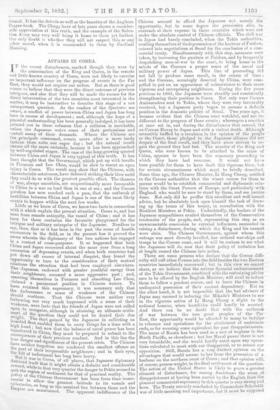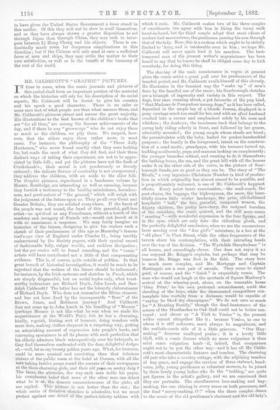AFFAIRS IN COREA.
IF the recent disturbances, marked though they were by the assassination of the King and Queen, in the remote and little-known country of Corea, were not likely to exercise an important influence on the progress of events in the Far East, they would not require our notice. But as there is good reason to believe that they were the direct outcome of previous intrigues, and also that they will be made the excuse for the direct intervention of the two countries most interested in the matter, it may be instructive to describe this stage of a not unimportant question. As the readers of the Spectator are aware, a conflict of power between China and Japan has long been in course of development ; and, although the hope of a peaceful understanding has been generally indulged, it has been pointed out in these columns that a collision is inevitable, unless the Japanese waive some of their pretensions and entail many of their demands. Where the Chinese are the principals concerned, events move after a more tardy fashion than suits our eager day ; but the natural result ensues all the more certainly, because it has been approached by well-regulated stages. The case of the long-growing quarrel between China and Japan is very typical of this truth. It has been thought that the Government, which put up with insults in Formosa and Leo Chao, would be slow to resent an open injury in Coma. The result may show that the Chinese, with characteristic astuteness, have deferred striking their blow until they could do so with the greatest possible effect, The chances of war, always uncertain, are unquestionably more favourable to China in a war on land than in one at sea ; and the Oman question has now reached such a pass, that the outbreak of hostilities between China and Japan is one of the most likely events to happen within the next few weeks. Little as we know of Corea, we know two facts in connection with it which explain the present situation. Corea is, and has been from remote antiquity, the vassal of China ; and it has been for three centuries the favourite playground for the intrigue and military enterprise of the Japanese. Needless to say, then, that as it has been in the pa.st the scene of hostile encounters in the field, so in the present has it proved the arena wherein the diplomacy of the two nations has engaged in a contest of cross-purposes. It so happened that both China and Japan recovered about the same year from a long succession of depressing events, and when both countries had put down all causes of internal disquiet, they found the opportunity to turn to the consideration of their mutual relations the attention that had been employed elsewhere. The Japanese, endowed with greater youthful energy than their neighbours, assumed a more aggressive part ; and, asserting themselves in Formosa and absorbing Loo Cho°, claimed a paramount position in Chinese waters. To have retained this supremacy, it was necessary only that the forbearance or sense . of weakness of the Chinese should Continue. That the Chinese were neither very forbearing nor very much impressed with a sense of their weakness, were facts that the friends of Japan were not called upon to recognise, although in attaining an ultimate settle- ment of the question they could not be denied their due weight. The start gained by the Japanese in collicting an ironclad fleet enabled them to carry things for a time with a high hand ; but now that the balance of naval power has been transferred to China, they must be prepared to submit to the consequences of their previous conduct. And in this lies the true danger and significance of the present crisis. The Chinese hare neither forgotten nor condoned the smallest offence on the part of their irrepressible neighbours ; and in their eyes, the bill of indictment has long been heavy. as in Corea, of all places, that Japanese diplomacy fl tItIt it ‘\r flatted itself that it might obtain a definite and considerable reward, while in that very quarter the danger to Pekin seemed to quit the region of sentiment for that of practical reality. The policy of the Chinese Government has been from time imme- aerial to allow the greatest latitude to its vassals and tributaries, ' se long as the nominal ties between them and the Empire are maintained. The apparent indifference of the
Chinese seemed to afford the Japanese not merely the opportunity, but to some degree the permission also, to encroach at their expense in those countries which were not under the absolute control of Chinese officials. The civil Near in Japan had barely concluded, when the Tokio authorities, availing themselves of their possession of the harbour of Faishan, entered into negotiations at Seoul for the conclusion of a com- mercial treaty. Simultaneously with this step, measures were taken, by increasing the garrison at Faishan, and by frequently despatching men-of-war to the coast, to bring home to the minds of the Coreans a proper sense of the naval and.
military power of Japan. This line of proceeding did not fail to produce some result, in the course of time ; and the Coreans, seemingly deserted by China, were com- pelled to put on an appearance of subservience to their more- vigorous and enterprising neighbours. During the five years previous to 1881, the Japanese were steadily and consistently strengthening their position in Corea. Not only were Corean Ambassadors sent to Tokio, where they were very favourably received, but a Japanese party began to assume a definite position in the domestic politics of Seoul. Two years ago, it became evident that the Chinese were watchful, and not in- different to the progress of these events ; whereupon a reaction at once set in, and during the disturbances that ensued, the ex-Corean Envoy to Japan met with a violent death. Although ostensibly baffled by a revulsion in the opinion of the people or the Court, those pledged to the Japanese alliance did not despair of the final result, and they have since striven to re- gain the ground they had lost. The murder of the King and Queen, who were known to be attached to the cause of China, appears to have been the summary proceeding to which they have had recourse. It would not hare been possible for them to have dealt this vigorous blow, but for certain circumstances which must be briefly described. Some time ago; the Chinese Minister, Li Hung Chang, notified to the Corean authorities that the wisest course for them to pursue would. be to establish commercial and diplomatic rela- tions with the Great Powers of Europe, and particularly with England, who would be sure to stand by them, and see justice done. Not only did he proffer this excellent and well-meant advice, but he absolutely took upon himself the task of draw- ing up the terms of this treaty, in consultation with the Resident Ministers at Pekin. Undoubtedly, the leitders of the- Japanese sympathisers availed themselves of the Conservative tendencies of the people, and, representing this step as an unwarrantable concession to external influences, succeeded in raising a disturbance, during which tLc King and his consort were slain. The Chinese Government, against whom this- outrage was most directly levelled, has ordered war-ships and troops to the Corean coast, and it will be curious to see what the Japanese will do, now that their policy of irritation has at length roused the Chinese into action.
There are some persons who declare that the Corean diffi- culty will call other Powers into the field besides the two Eastern countries immediately concerned ; but in this view we cannot share, as we believe that the serious financial embarrassment of the Tokio Government, combined with the restraining advice sure to be offered by the English Minister, will avail to induce them to follow a prudent course, and to leave the Chinese is undisputed possession of their ancient dependency. But on the other hand, it is not impossible that the bad advisers of Japan may succeed in inducing the Mikado's Ministers to see in the vigorous action of Li Hung Chang • a slight to the national honour, when hostilities could hardly be averted. And there can be no doubt that with the outbreak of war between the two great peoples of the Par East, the opportunity would be afforded to many to indulge• in schemes and operations for the attainment of ambitious ends, or for securing some equivalent for past disappointments. The name of Russia has been used as a sort of bugbear in the North Pacific, as elsewhere ; but her Naval power there is not very formidable, and she would hardly enter upon any opera- tions calculated to meet with our disapproval, or to arouse our opposition. Still, Russia has a very distinct ,opinion on the advantages that would accrue to her from the possession of a harbour on the northern coast of Corea ; and that opinion will, of course, possess weight, in the final settlement of the question. The action of the United States is likely to prove a granter element of disturbance, for among. Americans the sense of disappointment at having been ousted by the English from the places of commercial supremacy in this quarter is very strong and keen. The Treaty recently concluded by Commodore Schufeldt was of little meaning and importance, but it must be supposed to have given the United States Government a locus standi in this matter. Of this they will not be slow to avail themselves, and as they have always shown a greater disposition to act through Japan than through China, they may seek to inter- pose between Li Hung Chang and his objects. There is un- doubtedly much room for dangerous complications in this direction ; but if the Chinese will only send at once a sufficient force of men and ships, they may settle the matter to their own satisfaction, as well as to the benefit of the harmony of the rest of the world.































 Previous page
Previous page